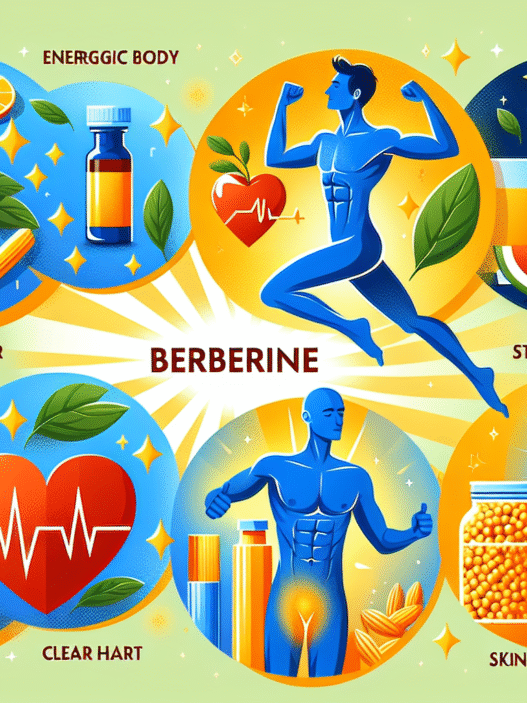Understanding Berberine and Vitamin D
A closer look at berberine and vitamin D reveals their potential health benefits and how they might work together.
Berberine Basics
Berberine is a bioactive compound found in several plants, including barberry, goldenseal, Oregon grape, and tree turmeric. These plants have a rich history of use in Ayurvedic and traditional Chinese medicine for various health benefits, particularly concerning metabolic health. Research indicates that berberine may support blood sugar regulation and can enhance the effects of diabetes medications, making it a potential ally for individuals with type 2 diabetes who may not respond well to traditional options due to issues with liver, kidney, or heart health (Healthline).
Vitamin D: An Overview
Vitamin D plays a crucial role in maintaining overall health, particularly for bone health. A noteworthy study involving postmenopausal women demonstrated that a combination of berberine, vitamin D3, and other supplements resulted in significant improvements in bone turnover markers. Participants receiving the combined treatment exhibited a 31% reduction in serum osteocalcin as opposed to a 19% increase in the placebo group. Moreover, the treatment group experienced a 13% increase in serum 25-hydroxyvitamin D levels, while the placebo group saw a 25% decline, highlighting the potential synergy between berberine and vitamin D in enhancing bone health (PubMed).
Understanding these fundamentals about berberine and vitamin D lays the groundwork for exploring their combined benefits, potential interactions, and dosages. For additional insights into the benefits of berberine, refer to our article on what are the benefits of taking berberine?.
Benefits of Berberine and Vitamin D Combination
Combining berberine and vitamin D may produce notable health benefits, particularly regarding bone health, blood sugar levels, and blood pressure regulation. Exploring these benefits can provide insights into the potential of this combination in health management.
Impact on Bone Health
Research indicates that a combination of berberine, vitamin D3, and other supportive compounds can positively influence bone health. In a 14-week trial involving postmenopausal women, this combination resulted in a 31% mean reduction in serum osteocalcin, a key marker for bone turnover. In contrast, a placebo group displayed a 19% increase in osteocalcin over the same period.
| Treatment Group | Change in Osteocalcin (%) |
|---|---|
| Combination of berberine, vitamin D3, and K1 | -31% |
| Placebo Group | +19% |
This evidence suggests that combining berberine and vitamin D may enhance bone metabolism and maintain bone density, which is particularly beneficial for postmenopausal women.
Effects on Blood Sugar Levels
Berberine is widely recognized for its potential in managing blood sugar levels, often compared to traditional diabetes medications. Studies show that berberine could assist in reducing blood sugar levels and improving insulin sensitivity. When combined with vitamin D, the effects may be amplified, as vitamin D has been linked to maintaining glucose levels in the body.
With regular consumption of both supplements, individuals managing blood sugar levels may experience improved outcomes, contributing to better overall metabolic health. For those seeking more information, check out our article on what are the benefits of taking berberine?.
Influence on Blood Pressure
The combination of berberine and vitamin D may also influence blood pressure regulation. Berberine has been shown to interact with liver metabolized medications, which can affect cardiovascular health and the body’s ability to regulate blood pressure. While the specific impact of this combination on blood pressure is still under research, initial studies suggest a possible beneficial effect, particularly in individuals with existing hypertension or metabolic syndrome.
Individuals taking blood pressure medications should consult healthcare professionals regarding the use of berberine and vitamin D together to ensure safety and efficacy. More insights can be explored in the context of is berberine bad for kidneys or liver?.
In summary, the potential benefits of combining berberine and vitamin D encompass crucial areas such as bone health, blood sugar regulation, and blood pressure management, making it a topic of interest for those pursuing holistic wellness.
Potential Interactions of Berberine and Vitamin D
Understanding potential interactions between berberine and vitamin D is essential for individuals considering their supplementation. While both substances offer numerous health benefits, they may also affect certain medications and health conditions.
Cyclosporine Interaction
Berberine has been noted to decrease the speed at which the body breaks down cyclosporine, a medication commonly used to prevent organ transplant rejection (WebMD). This interaction may lead to increased effects and side effects of cyclosporine, requiring careful monitoring of patients who are on both berberine and this medication.
| Medication | Potential Interaction |
|---|---|
| Cyclosporine | Increased effects and side effects due to slower metabolism |
Diabetes Medication Interaction
Berberine is recognized for its ability to lower blood sugar levels. Therefore, individuals taking diabetes medications alongside berberine may experience a significant drop in blood sugar, leading to hypoglycemia. Close monitoring of blood glucose levels is advised to prevent any complications related to low blood sugar (WebMD).
| Medication | Potential Interaction |
|---|---|
| Diabetes Medications | Risk of hypoglycemia due to combined effects on blood sugar levels |
Blood Pressure Medication Interaction
When taken together, berberine may decrease the activation of certain blood pressure medications, like losartan. This could potentially reduce the effectiveness of these medications, making it crucial for individuals on blood pressure treatments to consult healthcare providers before combining them with berberine. Monitoring and dosage adjustments might be necessary to achieve optimal blood pressure control.
| Medication | Potential Interaction |
|---|---|
| Losartan | Reduced effects due to decreased activation |
As always, individuals should seek professional advice when combining supplements like berberine and vitamin D, especially when taking other medications. For more information on the benefits of berberine, visit our article on what are the benefits of taking berberine?.
Dosage and Recommendations
Recommended Daily Dosages
For individuals considering taking berberine, recommended daily dosages can vary depending on health goals and individual tolerance. Studies have shown that taking 600–2,700 mg of berberine daily may significantly lower fasting and long-term blood sugar levels, particularly beneficial for those with type 2 diabetes (Healthline).
Here is a general dosage guide:
| Health Condition | Recommended Dosage (mg/day) |
|---|---|
| General Health | 600 – 1,200 |
| Blood Sugar Management | 1,500 – 2,700 |
| Combination with Diabetes Medication | Monitor closely; consult a healthcare provider |
It’s essential for individuals to start at the lower end of the dosage range and gradually increase as needed while monitoring their body’s response.
Considerations for Safe Use
When taking berberine, specific considerations should be kept in mind to ensure safe usage:
-
Blood Sugar Levels: Berberine can lower blood sugar levels, so it may interact with diabetes medications. It’s advised to closely monitor blood sugar levels when taking both together, as there is a risk of hypoglycemia (WebMD).
-
Blood Pressure: Berberine might also lower blood pressure, which can be a concern when used alongside blood pressure medications, potentially causing hypotension. Regular monitoring is recommended.
-
Blood Clotting: Berberine could slow down blood clotting, so caution should be taken if it’s used with anticoagulant medications, as this may increase the risk of bruising and bleeding.
Always consult a healthcare provider before starting berberine, especially for those with underlying conditions or those taking other medications. More information on the implications of berberine can be found in articles like what are the benefits of taking berberine? and what happens if you take berberine for too long?.
Sources of Berberine
Understanding where berberine can be sourced is essential for those interested in its health benefits and potential applications. This section covers both natural sources and medicinal plants that contain berberine.
Natural Sources
Berberine is a compound predominantly found in specific plants. Several natural sources are well-documented, including:
| Plant Name | Common Use |
|---|---|
| Barberry | Traditionally used in herbal remedies |
| Goldenseal | Often used for its potential benefits in fighting infections |
| Goldthread | Utilized in traditional medicine for digestive issues |
| Oregon Grape | Known for its applications in treating skin conditions |
| Tree Turmeric | Sometimes used for its anti-inflammatory properties |
These plants have been utilized in both Ayurvedic and traditional Chinese medicine for thousands of years (NCCIH).
Medicinal Plants Containing Berberine
Several medicinal plants are particularly notable for their high concentrations of berberine. This compound is extracted from these plants and used for various health benefits including metabolic support and digestive health. Some key medicinal plants include:
- Barberry: Known for its potential to support glucose metabolism.
- Goldenseal: Often recommended for its antimicrobial properties.
- Oregon Grape: Traditionally used for liver ailments and digestive issues.
Each of these plants contributes to the therapeutic properties attributed to berberine, making them popular choices among those interested in natural health solutions.
For those questioning can you take berberine and vitamin D together?, it’s essential to consider the origins of berberine and its applications in holistic wellness. By incorporating these plants into a well-rounded health regimen, individuals can explore the advantages of berberine while being mindful of its effects.
Additional Supplements for Diabetes Management
When managing diabetes, some supplements can enhance treatment outcomes. Two noteworthy options are chromium and omega-3 fatty acids. Both have unique benefits that may assist in glucose processing and overall health.
Chromium and Glucose Processing
Chromium is an essential trace mineral that plays a critical role in the efficient use of glucose within the body. A deficiency in chromium could hinder the body’s ability to process glucose effectively, which is particularly important for individuals managing diabetes (NCCIH). Supplementing with chromium may improve insulin sensitivity and reduce blood sugar levels.
| Source of Chromium | Chromium Content (mcg) |
|---|---|
| Yeast | 1000 |
| Broccoli | 22 |
| Meat (beef, chicken) | 20 – 30 |
| Whole Grains (barley, oats) | 10 – 30 |
Omega-3 Fatty Acids and Diabetes
Omega-3 fatty acids are known for their heart health benefits and have been studied in relation to diabetes management. Though findings on their effects remain conflicting, some research suggests that omega-3s may help reduce inflammation and improve lipid profiles, resulting in better overall metabolic health (NCCIH).
| Source of Omega-3 Fatty Acids | Omega-3 Content (g) |
|---|---|
| Flaxseed Oil | 7.26 |
| Fish Oil (Salmon) | 2.2 – 2.6 |
| Walnuts | 2.57 |
| Chia Seeds | 5.06 |
While both chromium and omega-3 fatty acids may provide support for diabetes management, it is essential to consult with a healthcare professional before starting any new supplement regimen. Understanding how these supplements work and ensuring they complement existing treatments, including berberine, can enhance overall health outcomes.





















